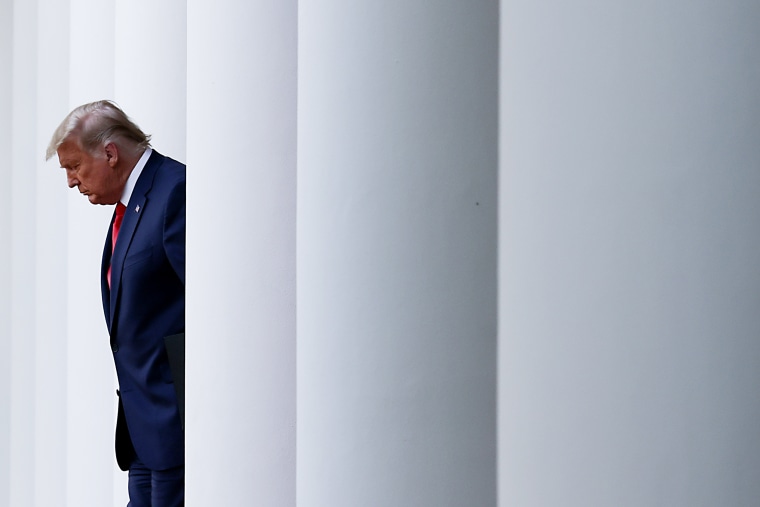Donald Trump’s phone call with Georgia Secretary of State Brad Raffensperger is notorious for good reason. On Jan. 2, 2021, as the then-president searched for ways to maintain power despite his election defeat, Trump appealed to the Georgia Republican to “find” votes that would flip the state’s election results. All of this, of course, is the basis for an ongoing criminal investigation.
But as part of the same conversation, Trump, citing research he didn’t identify, said, “So dead people voted, and I think the number is close to 5,000 people. And they went to obituaries. They went to all sorts of methods to come up with an accurate number, and a minimum is close to about 5,000 voters.”
Not surprisingly, the then-president was pointing to data that he’d just made up. What is surprising is the information that was available to him at the time. The Washington Post reported:
[A] report commissioned by his own campaign dated one day prior told a different story: Researchers paid by Trump’s team had “high confidence” of only nine dead voters in Fulton County, defined as ballots that may have been cast by someone else in the name of a deceased person. They believed there was a “potential statewide exposure” of 23 such votes across the Peach State — or 4,977 fewer than the “minimum” Trump claimed.
A similar story unfolded in Nevada, where the former president’s lawyers claimed there were 1,506 ballots cast in the names of dead people, while Trump’s own researchers concluded there were, in reality, maybe as many as 20 such examples statewide.
The research came by way of the Berkeley Research Group, which as we discussed last month, is well known in legal and corporate circles as a leading consulting firm with prominent clients. When Trump’s political operation set out to scrutinize the 2020 presidential election, and it sought out expert researchers, it turned to BRG to do the heavy lifting.
In fact, the Post reported several weeks ago that Team Trump hired BRG researchers to look for evidence of voter fraud and election irregularities, but when they couldn’t find any evidence — and actually ended up disputing their client's bogus claims and conspiracy theories — the Republican operation quietly buried the Berkeley Research Group’s conclusions.
“They looked at everything: change of addresses, illegal immigrants, ballot harvesting, people voting twice, machines being tampered with, ballots that were sent to vacant addresses that were returned and voted. Literally anything you could think of,” an insider familiar with the BRG findings explained. “Voter turnout anomalies, date of birth anomalies, whether dead people voted. If there was anything under the sun that could be thought of, they looked at it.”
As my MSNBC colleague Hayes Brown recently added, Trump “must have really hated that his campaign spent over $600,000 to be told he was wrong.”
Today's new reporting adds to the story, with fresh details about the scope of the Republican's fraudulent claims.
Why is this making headlines again now? It’s not just because there’s fresh evidence of the former president lying about his election defeat, though that’s certainly the sort of detail that should be of interest to his followers who still believe the “Big Lie.” It’s also not just because Trump’s claims were discredited by his own researchers, though that’s of interest, too.
Rather, it’s because of who else has taken an interest in the BRG findings. From the Post’s report:
The “Project 2020” report conducted by the Berkeley Research Group has now been obtained by prosecutors investigating the Jan. 6, 2021, attack on the U.S. Capitol. ... The Justice Department has sought and obtained multiple reports, emails and interviews from witnesses that show campaign officials analyzing, and often discrediting, claims that Trump was making publicly, according to several people involved in the investigation, who like some others spoke on the condition of anonymity to disclose internal details. The Berkeley report was provided to the Justice Department earlier this month, one of the people said, after some people involved in its crafting received a subpoena.
So let’s take stock.
In Trump’s hush money scandal in New York, the case is moving closer to a possible indictment.
In Trump’s election interference scandal in Georgia, the case is moving closer to a possible indictment.
In Trump’s Mar-a-Lago scandal, federal prosecutors are reportedly moving forward with dozens of new subpoenas.
And in Trump’s Jan. 6 scandal, federal prosecutors apparently have the findings of his own researchers, who found that he was lying about the election results.
If the former president is feeling optimistic about his legal future, he’s not paying close enough attention.

